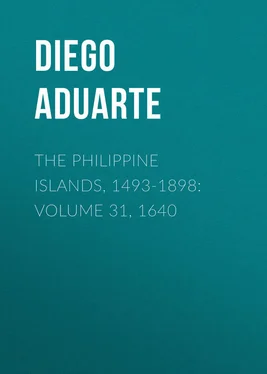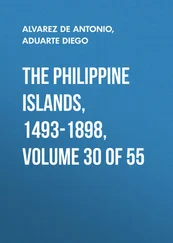Diego Aduarte - The Philippine Islands, 1493-1898 - Volume 31, 1640
Здесь есть возможность читать онлайн «Diego Aduarte - The Philippine Islands, 1493-1898 - Volume 31, 1640» — ознакомительный отрывок электронной книги совершенно бесплатно, а после прочтения отрывка купить полную версию. В некоторых случаях можно слушать аудио, скачать через торрент в формате fb2 и присутствует краткое содержание. ISBN: , Жанр: foreign_antique, foreign_prose, Историческая проза, на английском языке. Описание произведения, (предисловие) а так же отзывы посетителей доступны на портале библиотеки ЛибКат.
- Название:The Philippine Islands, 1493-1898: Volume 31, 1640
- Автор:
- Жанр:
- Год:неизвестен
- ISBN:http://www.gutenberg.org/ebooks/42399
- Рейтинг книги:5 / 5. Голосов: 1
-
Избранное:Добавить в избранное
- Отзывы:
-
Ваша оценка:
- 100
- 1
- 2
- 3
- 4
- 5
The Philippine Islands, 1493-1898: Volume 31, 1640: краткое содержание, описание и аннотация
Предлагаем к чтению аннотацию, описание, краткое содержание или предисловие (зависит от того, что написал сам автор книги «The Philippine Islands, 1493-1898: Volume 31, 1640»). Если вы не нашли необходимую информацию о книге — напишите в комментариях, мы постараемся отыскать её.
The Philippine Islands, 1493-1898: Volume 31, 1640 — читать онлайн ознакомительный отрывок
Ниже представлен текст книги, разбитый по страницам. Система сохранения места последней прочитанной страницы, позволяет с удобством читать онлайн бесплатно книгу «The Philippine Islands, 1493-1898: Volume 31, 1640», без необходимости каждый раз заново искать на чём Вы остановились. Поставьте закладку, и сможете в любой момент перейти на страницу, на которой закончили чтение.
Интервал:
Закладка:
Diego Aduarte
The Philippine Islands, 1493-1898: Volume 31, 1640 / Explorations by early navigators, descriptions of the islands and their peoples, their history and records of the catholic missions, as related in contemporaneous books and manuscripts, showing the political, economic, commercial and religious conditions of those islands from their earliest relations with European nations to the close of the nineteenth century
Chapter XXXVIII
The advance made by the Indians of this province in virtue, and their attendance upon the sacraments
Even if the religious in this province of Nueva Segovia had done no other good than bringing to an end or preventing so many sins of idolatry as these Indians used to commit, every day and every hour, by adoring the devil and offering him superstitious reverence in all the ways which have already been described, a very great service indeed would have been done to the Lord, to whom all such actions as these are directly offensive. In these idolatrous acts His honor is taken from Him, and His divine supremacy is overthrown and given to His greatest enemy. To prevent one of these offenses to God would be of much more merit than to prevent any homicide whatsoever, for that is a direct offense only against a man; while idolatry is directly against God, and takes from Him His divine honor, which is much more valuable than the life of a man. If this be true, how high is the merit of having prevented the innumerable acts of idolatry which used to be committed daily by those Indians, and having brought to an end the multitude of sins which followed upon this one – constant wars, murders, robberies, drunkennesses which surpassed one another, lewd actions, and all the other vices which were committed – without the rulers of those people concerning themselves the least in them or punishing them, except when they personally were wronged. And this they did, not out of zeal for justice, but as their personal act of revenge, so that they sinned more in the excess of the punishment than the delinquents had sinned in the faults for which they were punished. Now all these evils came to an end, as the result of the preaching of the religious, to the great glory of God. Hence, if they had done no more than this, very great indeed would the service have been which thereby they wrought and continue to work for the Creator of all and the universal Lord. But this was not all; for when these evil growths had been rooted out, there were planted in the hearts of these Indians the opposite virtues. By the aid of the Lord they began so soon to bear flowers and fruit that the first bishop of this province, Don Fray Miguel de Venavides, a holy and most learned prelate, wrote to his Holiness Clement VIII, who at that time governed the church, the following report, in which he gives a faithful account of the establishment of his bishopric, with the accuracy to which his office and dignity obliged him. “This province,” he says, “is very new in the preaching of the gospel, for it is only three years since there were ministers of the Order of St. Dominic in it. Before that time there used to be seen now and then a priest in the place where the Spaniards lived. As for preaching to the Indians, there was no idea of such a thing. This province is very near Great China, being distant from it less than seventy leguas; so that now the faith of the Lord appears to be approaching their powerful and great kingdom. The native race of the province is a very spirited one, whom it has cost the Spaniards many efforts and the lives of many men to subdue. As soon as the Order of St. Dominic came into this region, they immediately went to live among the Indians; and they built their churches and houses, which were more like huts built to last two days. They employed upon them very few laborers, and had no teacher or journeymen. The Indians would have died before they admitted them to their villages (and, as it was, there was some difficulty about it), if the good name of those who had been in Pangasinan had not reached these Indians also – who in this way learned how the religious treated the Indians as if they were their own children, and defended them against those who wronged them. When they began to consider the mode of life followed by the religious, their patience and labors, their avoidance of flesh food, their many fasts, continual prayers, great poverty – for the poverty of the Order of St. Dominic here is very great – and the gentleness and love with which they treated the natives, God was pleased that in those villages where there are missionary religious, all the inhabitants desired to be Christians. They have not only become very devout toward God, but very friendly to the Spaniards; thus the religious have put peace and security where they were not before. As a result, in regions where soldiers and garrisons used to be necessary, there now are none, and the country is very peaceful. Every evening the men gather together and recite prayers before a cross, which is usually set up in the plaza of the village, the women doing the same by themselves in another place. Baptisms in the heathen villages are constantly increasing, while those for whom there are not missionaries enough ask for them with all their hearts, and are so desirous to become Christians that we ought therefore to offer thanks to God. [Some chiefs invited the missionaries to their village, saying that they all wished to become Christians. A Spaniard who had command in one village where they were building a church, directed the soldiers to interfere with the work, which would have injured his private interests; but within a short time all those men died horribly. The fathers drive out devils from those who are possessed by them. It is only for lack of missionaries that the whole country is not filled with churches.”
The report is very short, and it is therefore necessary for us to expand upon it, making use of the reports of the founders and first missionaries themselves. In addition to what has already been said, they report as follows. Great as was the labor of bringing these souls from darkness to light, they have come to understand their duties, worshiping the Lord with great devotion, and regularly attending His holy sacraments. They go beyond the commandments of God and of His church to do additional works of devotion – especially the women, for they can more easily come to be instructed, and can more easily do what they are told, as they are less occupied than the men are with things to distract their minds and thoughts. Some of them are so devout that they walk always in the presence of God, doing nothing without an inward prayer to Him. In Tular, or Abulug, a village of more than a thousand inhabitants, in which there were more communicants than in the other villages, the religious taught many of them to strive to meditate every day upon some of the mysteries of the rosary. This was an exercise to which the first founder of the province, father Fray Juan de Castro, was very much given, and in which many of his disciples and subjects have followed him. Thus these Indians day by day meditate upon one after another of the fifteen mysteries of the rosary. Other Indians lay aside part of their daily food for charity. Bringing about these results requires from the minister much labor, teaching, assistance, perseverance, and prayer; for without these there is very little or nothing that they can do of themselves, without books or any other guide to direct them. As it is, the Indians have advanced wonderfully – visiting and caring for their sick, especially when they are poor; taking discipline at night in their houses; fasting beyond what they are required; frequenting the churches; and offering their prayers at dawn and at evening. There were some of them who, at the very beginning of their Christian career, went through the fields looking for the little children of poor people who could not take them to town; and, bringing these to be baptized, they acted as their sponsors, making gifts to them afterward of swaddling-clothes or some such thing. Heavy as are the labors of the religious, their joy in them is still greater.
Читать дальшеИнтервал:
Закладка:
Похожие книги на «The Philippine Islands, 1493-1898: Volume 31, 1640»
Представляем Вашему вниманию похожие книги на «The Philippine Islands, 1493-1898: Volume 31, 1640» списком для выбора. Мы отобрали схожую по названию и смыслу литературу в надежде предоставить читателям больше вариантов отыскать новые, интересные, ещё непрочитанные произведения.
Обсуждение, отзывы о книге «The Philippine Islands, 1493-1898: Volume 31, 1640» и просто собственные мнения читателей. Оставьте ваши комментарии, напишите, что Вы думаете о произведении, его смысле или главных героях. Укажите что конкретно понравилось, а что нет, и почему Вы так считаете.












